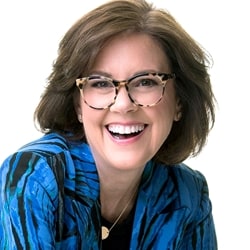
Ten years ago, I was fidgeting at the back of a conference room in downtown Indianapolis as waves of people filed past me to take their seats. I'd arrived to deliver a talk based on my then brand-new book, Content Rules.
I felt like I might throw up.
I'd been on panels before, but this would be my first solo flight. The very idea that 400 marketers had shown up in the room just to hear me (and me alone!) filled me with a familiar anxiety.
My stomach roiled. I was cold. Or was I hot?
What if I just turned around right now and bolted out of this convention center and ran straight back to the airport...?
The first time I'd felt that feeling, I was in the second grade. I was a finalist in our classroom spelling bee competition when our teacher, Mrs. Fiske, announced hey guess what kids...! The winner of the classroom bee will go on to compete in a schoolwide competition in the auditorium later in the week!
I'm competitive. But not at any cost.
Standing on stage as the sole classroom rep in a schoolwide competition, spelling into a microphone...? For a shy, bookish 7-year-old... how would that be "winning," Mrs. Fiske?
In the classroom, my final competitor was this know-it-all boy named Bobby. We volleyed for a bit, Bobby and I, spelling back and forth. But then Bobby missed a word (Ha! Not so know-it-all now, are you, Bobby!), and Mrs. Fiske turned to me.
At last it was my final turn. Spell this last word right, and I'd take it all...
The glory of crushing Bobby and being crowned classroom champion!
The praise of friends, teachers, the PRINCIPAL!
A chance to compete in a tournament with the whole school! Even the Fifth Graders!
For most kids, that would be heady stuff—a legendary, make-it-work moment that could bathe an elementary school pupil in a warm, winning glow for years... "Oh you have Annie Handley in your classroom?" I imagined one teacher saying to another in the years to come. "You mean Annie, the Spelling Bee Champion?"
Mrs. Fiske delivered my word: "Spell: FROM," she said. Then she used it in a sentence, spelling-bee style: "The birthday gift was FROM Grandma."
FROM? My word was FROM? Any baby could spell FROM! I couldn't believe my luck...! But wait... then I remembered: Uh-oh. THE. STAGE.
Mrs. Fiske's eyes locked on mine. She'd delivered a softball. And we both knew it. I loved her second-grade classroom. She really liked me, too. I knew she wanted me to win. All I needed to do was spell that word that even a dummy knew.
But you know what's coming. That's not what happened. Nope. Not at all.
I whiffed it. I threw the Bee. Intentionally.
I'd like to say it was because I was principled, even honorable. That I rejected the easy win Mrs. Fiske offered because it felt rigged.
NOPE. I wasn't that kid. I would have claimed that victory, no problem, if it didn't come coupled with the terrible-sounding "prize": Standing on stage. Spelling into a microphone. Competing with worldly fifth graders who could probably spell words with more than one syllable.
Not even the promise of a warm, lasting afterglow could counter my worry about all that.
In front of the whole second-grade class, I spelled out loudly, clearly:
F.
R.
U.
M.
I misspelled a word any baby knows how to spell. Even the dumbest baby.
Mrs. Fiske stared at me with a confused look that said: Why would you whiff such a softball...? Of course, I acted like I really didn't know. I couldn't tell her the real reason.
Because as foolish as I felt spelling out FRUM in front of everyone... As gutted as I was letting that smug Bobby lap me... And even the hot shame I felt from Mrs. Fiske's stare still didn't feel as terrible as the alternative.
Bobby walked away with the win. I walked away with the runner-up gift of a Hershey bar.
In Indianapolis 10 years ago, there was no Bobby.
And anyway, I didn't need him: I was a grown up. I'd written a book, for God's sake, and I wanted to tell people about it. Ignore your stomach. Forget the internal hot/cold dialogue. You'll be fine.
Why the shift? What had changed? Mostly, I was just sick of it. Sick of the cop-out and the opt-out. Sick of saying no. Sick of keeping mum when I had a lot to add.
I don't really know what it was. I'd just decided it was time to step up.
Literally, in this case: I stepped up on the stage at the front of the room. I got right behind the microphone. I opened my mouth. And I started speaking.
It wasn't perfect—I wasn't perfect. I loitered too close to the safety of the lectern. I mumbled a bit. At one point my heart was pounding so loudly in my chest that I could hear it in my ears.
But I also got laughs, including one big one from a story I told about being confused for Tina Fey in a hotel lobby. Someone came up afterward: "You really are kinda like Tina Fey," he said.
So, after Indianapolis—when I didn't die, and I didn't even throw up, and I actually kind of enjoyed the audience—I worked at it.
I said yes to anyone who wanted me to come speak. I took some classes. I studied speakers I admired. I hired a coach. Then—a few years later—I hired another.
I learned how to best structure a talk. I learned the value of rehearsing (it's boring and brutal, but necessary).
Over time, I figured out what worked for me on stage; I discarded what didn't.
The goal of all of that was to help me become more comfortable on stage. The surprising part was that it also helped me be more comfortable in my own skin.
A few months ago, I gave the closing keynote to a group of 4,000 marketing and PR professionals at an industry conference. I shared stories. I offered my point of view. I danced across the stage with my signature Mom-dance moves. I had fun. At the end, the entire audience erupted in a standing O.
Backstage, a younger woman approached. "I don't know how you do that... but I hope I can, too, one day," she said.
I told her that of course she could.
I told her, It sounds cliché to say you can do anything you set your mind to, doesn't it? But this... you really can. And you might surprise yourself more than anyone.














